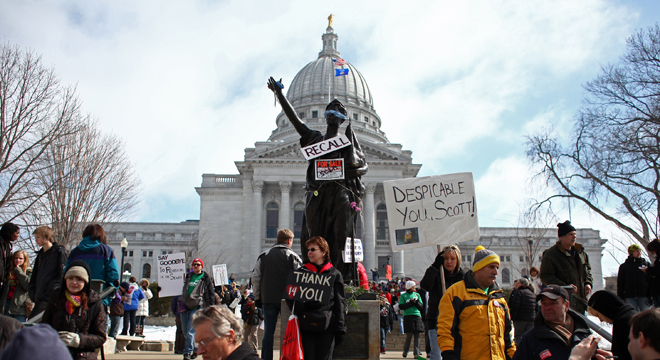State election officials in Wisconsin have rejected a challenge by Democrats, who were seeking to knock out fake “protest” candidates that Republicans have registered to run in the Democratic primaries for the spring recalls.
Republicans have recruited a candidate, and collected ballot signatures, for each of the six recall Democratic primary elections for governor, lieutenant governor and four state Senate seats.
The “fake” recruits could especially make an impact in the state Senate races. Without them, only one Republican and one Democrat would be running in each race, thus making a primary unnecessary and triggering the general election on May 8 — the same time as the statewide Democratic primary for governor, which would have sharply increased Democratic turnout.
Republicans also have a “fake” candidate in the race for governor, where there is a genuine, contested primary, and the race for lieutenant governor, in which both the official Democratic candidate and another individual qualified for the Democratic ballot.
At the non-partisan Government Accountability Board’s meeting Tuesday, Democratic attorney Jeremy Levinson argued that the filing of fake Democrats was a manifest, admitted fraud on the system. The board ultimately voted 6-0 to allow the candidates to stay on the ballot, at the recommendation of the board staff.
The board’s staff had issued a memo on Monday, determining that any inquiry into the motives and beliefs of registered candidates would involve subjective judgments about political activity, and thus run afoul of the First Amendment. As a result, they said, the board did not have any legal authority to take the action Democrats were seeking.
“Now we all agree that in most instances, the investigation and enforcement of this kind of thing would be prohibited, because the First Amendment does not allow the government to define political beliefs, or interrogate citizens about their political beliefs. But the First Amendment does not require the government to ignore an admitted lie, and that is what we have here,” Levinson said.
Levinson also posited that some people might have been “swindled” into signing petitions for the fake candidates, thinking they were Democrats who were hoping to win the recalls. But Levinson, when asked by the board, said he did not have affidavits from any voters who were fooled to that effect.
Republican attorney Joe Olson invoked Wisconsin’s open primary law, under which anyone can vote in a party primary — going back to 1906, when the progressive movement led by Bob La Follette sought to take away the power of the state’s Republican Party leaders.
“The point of the open primary is to effectuate the will of the electors, not the will of the political elite,” said Olson. “The will of the electors is expressed at the ballot box in the Democratic primary. If enough people think these people shouldn’t be representing the Democratic Party, they won’t vote for them in the Democratic primary.”
Earlier, a notable appearance was made by one of the official Democratic candidates, Lori Compas, who is challenging state Senate Majority Leader Scott Fitzgerald. Compas said that she recognized the GOP incumbents’ concerns about the electoral calendar, and said she would have the same concerns if the party roles were switched — but that the presence of the fake candidates amounted to having false information on the ballot itself. Instead, she said, the protest candidates should have run in the Republican primary, in order to force a primary on that side and thus have the desired effect on the calendar.
She also told a story of her own signature-collecting activities. “A woman asked me for some kind of proof that i was the ‘real’ candidate,” said Compas. “She asked me if the ballot would indicate which candidates were fake, and which candidates were real. This is truly a bizarre situation. people need to be able to trust the information that appears on their ballots. that’s why we have statues covering election fraud.”
This Republican strategy dates back to last year’s state Senate recalls. Soon after the elections were triggered, Republicans declared their intention to plant fake candidates in the Democratic primaries — which they called “protest candidates” — in order to delay the general elections from July to August, while the GOP incumbents ran unopposed for their own nominations. The strategy worked, delaying the general elections — at a significant cost to the taxpayers.
Predictably, this also led to some low-level dirty tricks and mischief-making, with conservatives urged to vote in the Democratic primaries for the fake Dems. Democrats specifically rejected entreaties by labor to respond in kind and run fake Republicans, in order to keep Republican voters in their own primaries. In the end, all the official Dems won their primaries, though one of them was close — and that latter Dem badly lost the general election.






